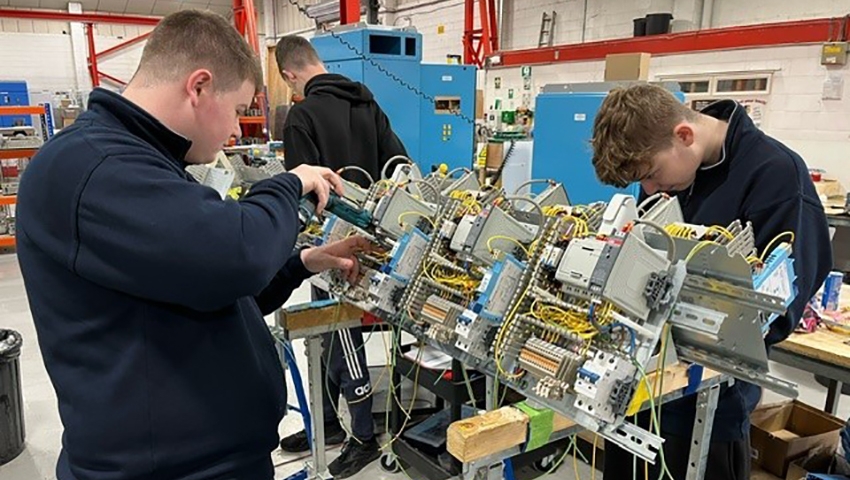

As T levels – the still relatively new, vocational qualification which is the equivalent of three A levels – become firmly established on the post-16 training and careers landscape, engineering and manufacturing employers in Leeds and beyond are starting to see the value in the industry placements that form a crucial element of the course.
______________________________________________________________________________________________________________________
Every T level student must complete a work placement of at least 315 hours, the equivalent of around 45 days, with the on-the-job experience designed to give students the opportunity to put their learning, knowledge and skills into practice in a real workplace environment.
For employers, having T level students – who are generally aged between 16 and 18 - on board offers a raft of benefits. Not least is the opportunity to identify and nurture future employees, laying the foundations for a pipeline of talent who are already knowledgeable about that business’ operations and culture.
Often ahead of the curve in the latest technologies and methodologies taught on their T level courses, students can also bring fresh perspectives and innovative ideas to a placement.
Simon Logan, site services co-ordinator at Technical Control Systems Ltd (TCS), which designs and manufactures switchboards and control panels in Leeds, is enthusiastic about his firm’s experience of hosting industry placements for engineer students at Leeds City College.
“If you’re able to engage, enthuse and nurture someone while they are young, they have the potential to become a great asset to your company for the future,” says Simon. TCS has so far taken on four T Level engineering students, with another two due to start in September.
“The Leeds Manufacturing Festival factory visits have been excellent in bringing young people with a great attitude directly in contact with us as a business,” says Simon.
His team were particularly impressed with the attitude of one recently visiting year 11 student who has opted to take T levels from September and they have offered him the chance to do his placement with the business, which he has accepted.
“Key to ensuring continuity for a business is finding candidates who really do want to work in your industry. Thanks in partly to the Manufacturing Festival, which has made the real-life connections between us and the youngsters, we’re seeing that hosting T level placement students can play a big part in successfully sourcing potential new talent.”
Simon points out that, while a student placement does not require financial investment, it is worth an employer investing time into the relationship, particularly at the outset.
“These students are teenagers and so of course they are still finding their way and working out exactly what they want to do as a career,” he says. “We have found that early engagement with them is crucial and it really useful to discuss in some detail the different options and career paths.”
He explains: “A young person may be very interested in working in electrical engineering for example but there are many different branches and careers within that sector and it’s really worth talking all the options through to ensure – both for the young person and the employer – that a placement with that particular business will be worth everybody’s time.”
Once a work placement is underway, it’s also vital to foster a good relationship between employer and placement student. “You have to remember that the student is doing the placement for free, so it’s important to appreciate their commitment and, of course, show them decency and respect.
“It’s very helpful if you have other younger employees and apprentices to mentor and show the way to someone on a placement,” adds Simon. “It is much easier for young people to relate to someone not too much older than themselves and helps with a realistic sense of career progression.”
TCS has a flourishing apprenticeship programme, with 13 apprentices on the path to becoming qualified while at the company, all of whom will potentially remain with the company to progress as employees.
Simon advocates organising mini projects for placement students that they can complete during the 45 days of their work experience. “We have also found that it’s a good idea if possible to arrange placements before the end of students’ first year and to try and get a block of their time over the summer holidays – it will give both student and employer a better idea of whether the relationship might progress to an apprenticeship or employment.”
For employers like TCS, facing the challenge of a shortage of skills and new talent, taking on a T level student for his or her work placement can be a positive step on the journey to addressing that problem.
It’s ideal in many ways,” reflects Simon Logan. “You have a ready-made sample of young people who are already keen to work in your industry. There is no cost to the business, apart from time, and you get to assess these students first hand to see whether they might be the future apprentices and employees that you are looking for: it really is win, win.”